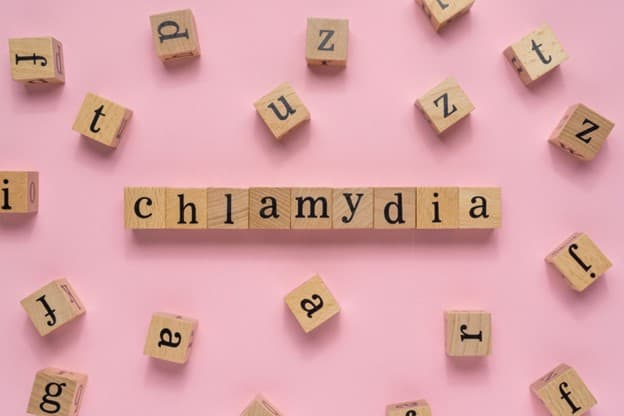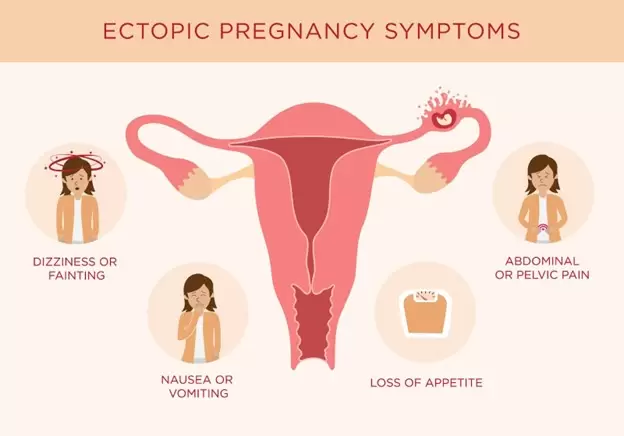Chlamydia is a sexually transmitted infection (STI) and is a preventable cause of pelvic inflammatory disease (PID). The CDC estimates there are 4 million new chlamydia infections each year. When left untreated, about 10-15% of sexually active individuals with chlamydia will develop PID. PID can cause permanent damage to reproductive organs and tissues, leading to infertility.
Continue reading to learn more about chlamydia, its effects on fertility, and how you can prevent the infection and spread of chlamydia.
Chlamydia Infection in Women and Men
Chlamydia is caused by bacteria (called chlamydia trachomatis) and spreads through infected semen, pre-ejaculate, vaginal fluids (sexual fluids), and genital contact with someone infected. It’s one of the most common STIs, and most people who have it don’t have any symptoms.
Chlamydia can infect the penis, vagina, cervix, anus, urethra, eyes, and throat. Symptomatic individuals may experience white or yellow vaginal discharge that smells bad. If you’re unsure whether your discharge is healthy, read our post about vaginal discharge and see a doctor.
Chlamydia can be easily cured and treated with antibiotics. Without treatment, chlamydia can cause health problems later in life, such as damage to the reproductive system and infertility.
Sexually active people and those with new or multiple sex partners are at risk for chlamydia. It’s essential to get tested regularly for STIs (generally once a year under the age of 25 or when you have new partners).
Can Chlamydia Cause Infertility?
If you don’t diagnose it and treat it, then it can simmer and make you infertile. Many people infected with this sexually transmitted disease (STD) have no symptoms. Chlamydia can cause fallopian tube infections in those without any symptoms.
Chlamydia and pelvic inflammatory disease (PID), if left untreated, can cause permanent damage to the upper genital tract, the fallopian tubes, the uterus, and surrounding tissues. PID can lead to irreversible infertility. If a person with fallopian tubes gets Chlamydia PID, 15-20% might develop infertility, usually related to their tubes.
Tubal infertility can be treated with IVF (in vitro fertilization) but it’s expensive.
How Long Does it Take Chlamydia to Cause Infertility?
There is no clear timeline for how long an untreated chlamydia infection takes to cause PID. One study suggests that PID can occur at any time throughout the course of a chlamydia infection. It’s important to understand that just because you get PID, does NOT mean you will be infertile.
The best way to prevent infertility from chlamydia is to prevent infection. In addition to abstinence and using condoms consistently and correctly, chlamydia and other STIs can be prevented by getting tested regularly and asking your partner to get tested before becoming sexually intimate.
Chlamydia Infection In Pregnancy
Current and prior chlamydia infections increase the risk of ectopic pregnancies, tubal infertility, and cervicitis pelvic Inflammatory disease.
How Does Chlamydia Cause Ectopic Pregnancy?
An ectopic pregnancy occurs when a fertilized egg attaches outside the uterus. Chlamydia increases the risk for PID, which increases the risk of ectopic pregnancy and tubal infertility.
People with a uterus who have had chlamydia are at a greater risk for ectopic pregnancy because of the lasting effects and complications of the infection. One study in the U.K. links this increased risk to the development of a particular protein found in fallopian tubes after infection, which makes a fertilized egg more likely to implant in the fallopian tube rather than the uterus.
Untreated chlamydia, and subsequent PID, can lead to other health issues, such as chronic pelvic pain, Bartholin cysts, and blockage of the Bartholin Glands.
Pregnancy complications
Untreated chlamydia infection has been linked to complications during pregnancy, including preterm labor, premature rupture of membranes, and low birth weight. Infection may also pass to the newborn during birth.
Screening and early treatment of chlamydia can help pregnant people reduce the risk of complications.
How is Chlamydia Diagnosed and Treated?
Now that we know the risks of chlamydia if left untreated, it’s important to get tested for STDs regularly. If you’re sexually active and have a new partner or multiple sexual partners, you may be at increased risk for STDs.
Chlamydia can be detected with a common STD test, like a vaginal swab or urine test. Chlamydia infections can be easily cured and treated with antibiotics.
Disclaimer: This article, even if and to the extent that features the advice of physicians and medical practitioners, is not, nor is it intended to be, a substitute for professional medical advice, diagnosis or treatment, and should never be relied upon for specific medical advice. Always seek the advice of your doctor/primary care provider for specific health needs.




